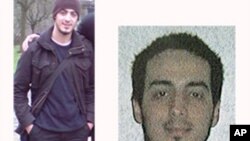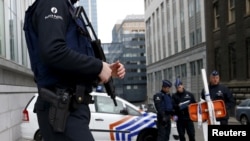Belgian authorities have identified a key accomplice of Paris attacks suspect Salah Abdeslam, as new developments underscore the tangled and far-flung network behind the November 13 terrorist attacks and rising new threats.
Investigators are searching for 24-year-old Belgian Najim Laachraoui, who went by an alias Soufiane Kayal, and is on the run. A statement by Belgium’s federal prosecutors’ office said he went to Syria in 2013. He was identified by his DNA during police searches in Belgium linked to the attacks.
According to French and Belgian media, his DNA was also found on one or more of the explosive belts used by the suicide bombers during the attacks.
Laachraoui had travelled to Hungary last September with Abdeslam and a third man, Belgium’s federal prosecutor office said.
Authorities believe the third man, earlier identified by his pseudonym Samir Bouzid, is Mohamed Belkaid, who was killed during a police raid last week in the Forest neighborhood of Brussels.
"We have quite a few pieces of the puzzle and in the last few days several pieces have found their place,” Belgium’s federal prosecutor Frederic Van Leeuw said at a joint news conference Monday in Brussels with his French counterpart Francois Molins.
But, Van Leeuw said, investigators were “still far from solving the puzzle” around the Paris attacks. Nor, he said, do they have much information on Abdeslam’s whereabouts between the attacks and his capture on Friday.
Also at large is another key suspect, 31-year-old Mohamed Abrini, who is believed to have been with Abdeslam in a black car that was found in northern Paris after the attacks.
Abdeslam was arrested with four other people during a police raid in the Brussels Molenbeek neighborhood where he grew up. His lawyer, Sven Mary, says he will fight demands for Abdeslam’s extradition to France and take legal action against Paris prosecutor Molins for passing information Abdelsam told interrogators to reporters.
Molins dismissed Mary’s claims, saying he had acted properly.
Abdeslam’s arrest has raised new questions over the nebulous network behind the Paris attacks. “We have found more than 30 people involved in the terrorist attacks in Paris, but we are sure there are others,” Belgium’s Deputy Prime Minister Didier Reynders said Sunday.
Belgian Interior Minister Jan Jambon said the country is on alert against potential revenge attacks following Abdesalem’s arrest. Stopping one terror cell, "can push others into action,” he told public radio.
“Clearly the threat remains very high, despite the arrest of Salah Abdeslam, because there are a number of individuals who are still on the loose,” said counter-terrorism expert Thomas Renard of the Egmont Institute, a Brussels-based think-tank.
“Some of them may be preparing another attack, some of them may just be waiting, but others may have come back from Syria traumatized,” he added. “Not all of them want to bring the Jihad on European territory.”
Meanwhile in Paris, French President Francois Hollande met with victims and families of those killed in the November attacks. Many have criticized the slow and chaotic response by French authorities following the attacks.
“The immediate management of victims needs to be improved, because there will be other attacks,” Aurelia Gilbert, a member of a victims group told France-Info radio.
Abdeslam is being detained at a maximum security prison in the northwestern city of Bruges, which also houses Mehdi Nemmouche, convicted of 2014 attacks on a Jewish museum in Brussels.
Abdeslam fits a now well-worn jihadi profile, some experts say, as he moved from petty crime to militant Islam.
“None of them have a long religious trajectory,” said Olivier Roy, an expert on political Islam and professor at the European University Institute in Florence, speaking broadly of other Islamists.
“They all lived completely secular lifestyles. They drank alcohol, they smoked hashish, they went out with girls, they were traffickers. Some committed petty crimes and were radicalized in prison,” he said.
The 26-year-old Abdeslam previously worked in a bar in Molenbeek with his brother Brahim, who blew himself up at a restaurant during the Paris attacks. Friends said he smoked pot and liked girls. He was a friend of suspected ringleader Abdelhamid Abaaoud, who was killed in a police shootout several days later, and the two spent time in jail.
Abdeslam’s brother Brahim was buried a day before his arrest. Abid Aberkan, who carried Brahim’s coffin, was also arrested at the same Brussels apartment on Friday. Belgian prosecutor Leeuw would not comment on whether the two events were linked.
On Saturday, Paris prosecutor Molins told reporters Abdeslam confessed to wanting to blow himself up at a Paris-area soccer stadium, one of the attack sites, but had backed down. He also said he was considering ideas to “restart something” around Brussels, Deputy Prime Minister Reynders said.
Van Leuuw said Belgian investigators worked on 315 anti-terror cases last year and nearly 60 this year, while Molins said France is dealing with 244 suspected terror cases involving more than 770 people.





